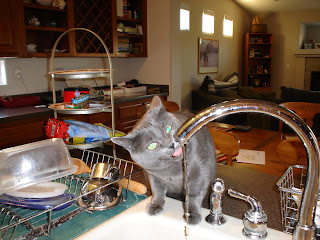Would you know what to do if your dog or cat had a medical emergency? Many pet owners say they do not. If the right call is made, thousands of little lives a year can be saved. They sound like 911 calls, but they're not for people; they're for pets. Frantic owners calling an emergency pet hotline. Caller: "She ran, hit her head on the wall and then started seizuring..." Animal Poison Control Dispatcher: "... Again, he should be absolutely fine." One of the scariest things for a dog owner is to open the door of the apartment, walk in and there is a pill bottle on the floor. From swallowing pills to chomping on chocolate and snacking on poisonous plants, the list of bad things that can suddenly strike your pet is long. But what many pet parents don't know is just a phone call away. Animal Poison Control Dispatcher: "When did the cat start showing signs then?" These are the people who answer your calls. They're all vets working round the clock at the ASPCA Poison Control Center in Urbana, Ill. In the last year alone they handled more than 140,000 calls. Karen O'Neil was one of them. Her 3-year-old dog, Kodos, helped herself to an entire bowl of raisins and chocolate -- a toxic mix for dogs. "It was about six in the morning, it was on a Saturday, so there were no vets, nobody was open," O'Neil said. Making matters worse, O'Neil has two dogs and didn't know which one was the culprit. So she called the Poison Control Center. "They were able to tell us the right amount of raisins that would be problematic for the size dogs, the amount of chocolate that would be problematic," O'Neil said. Not only that, the vet on call that morning talked O'Neil through the unpleasant task of inducing vomiting in her dogs. "And help them through it and it was great because it gave us a lot of piece of mind," O'Neil said. "If a pet gets into something that may have been toxic, time is of the essence," said a Poison Control dispatcher. The center may be located in Illinois, but it's open 24 hours seven days a week to everyone across the country. And it's not just for poisoning emergencies. The center's veterinarians can explain how to handle everything from a bug bite to swallowing foreign objects and heatstroke, a big problem this time of year. This time of year when you're getting ready to put your winter clothes away moth balls are highly toxic. Poison Control has already managed 113 cases of mothball poisoning.If you think that your pet may have ingested a potentially poisonous substance, call (888) 426-4435. The initial call costs $60, but follow-up calls are free.For more information, including emergency numbers, please click here and here.
Credit Source: CBS 2 New York
Thursday, April 30, 2009
Tuesday, April 28, 2009
Monday, April 27, 2009
Antifreeze poisoning in cats
As summer quickly approaches we will see temperatures rise higher than most parts of the country can only imagine. The temperature takes its toll on many facets of our life - including our vehicles. Between the extremely high air temperatures and the additional load put on our engines because the air conditioner is on, it is easy to understand that our cars can overheat. When cars overheat added pressure is produced in the cooling system and any weakened part is likely to fail or at least release fluid (antifreeze) to reduce the stress. The antifreeze leaving your sealed cooling system becomes a major health hazard for your pets. Ethylene glycol, the main ingredient in almost all major antifreeze brands, has an inviting aroma, and a sweet flavor. Its appealing smell and taste often tempt animals and children to drink the highly poisonous substance. "A large number of animals that ingest antifreeze do not recover," said Stephanie Shain, director of outreach for the Companion Animals section of The Humane Society of the United States. To lower the risk to animals and children, consumers can switch to a brand of antifreeze containing propylene glycol, a chemical ingredient that is less toxic than ethylene glycol. In addition to being safer, propylene glycol has a bitter taste that makes it less attractive to our pets. Although it's safer than ethylene glycol antifreeze, propylene glycol antifreeze is still toxic. To reduce the risk of poisoning, all brands should be handled as a highly poisonous substance. Even if you take all suggested actions to protect your loving companion, there's still a potentially lingering threat - your friends and neighbors. Most cars on the street contain this poisonous, but tasty, substance. Be overly conscious not to allow your pet to wander unattended near driveways, roads, garages or other places where they could come in contact with someone elses spillage.How To Detect Antifreeze Poisoning For pets exposed to antifreeze, the first few hours are critical. Animals who receive immediate veterinary care can recover successfully - but the longer they remain untreated the less likely they will survive. Antifreeze poisoning occurs in two phases. In the first phase, the animal typically appears lethargic, disoriented, uncoordinated and groggy. Symptoms usually appear 30 minutes to one hour after ingestion and can last for several hours. The second phase, which can last up to three days, is characterized by symptoms such as vomiting, oral and gastric ulcers, kidney failure, coma and death. Thousands of pets have suffered this deadly fate, prompting several states, and the federal government, to consider legislation that could drastically lower the incidents of antifreeze poisoning in both humans and animals. Normally, I would suggest calling the HSUS Poison Control Center for advise, but after I consulted with their doctor on staff it was advised to immediately bring your pet to a veterinarian or an emergency veterinary clinic because every minute could mean the difference between life and death.
Credit source: Animal Foundation April 2009 Newsletter
Credit source: Animal Foundation April 2009 Newsletter
Airline Travel for your pets
Las Vegas is a city known for visitors and locals coming and going on a regular basis. McCarran Airport has a steady stream of travelers passing through their doors on a 24/7 basis. Many of these travelers are in need of accurate information pertaining to traveling with their pet on specific airlines. In the past it was a tedious undertaking to research the specific rules and regulations of each individual airline. But now life has become easier. A single web-site has been created which list all the major airlines and with a single click of your mouse you can read, in detail, the guidelines as they pertain to pet travel on that specific airline. www.petflight.com/airlines is a great resource to answer your air travel questions concerning your animal companion and yourself. You may also be surprised to learn how may airlines will allow your animal companion to travel in the passenger compartment with you.
Credit Source: Animal Foundation April 2009 Newsletter
Credit Source: Animal Foundation April 2009 Newsletter
Sunday, April 26, 2009
Frostbite
Wednesday, April 22, 2009
Tuesday, April 21, 2009
Saturday, April 18, 2009
Parker and Sophie
Subscribe to:
Comments (Atom)




















